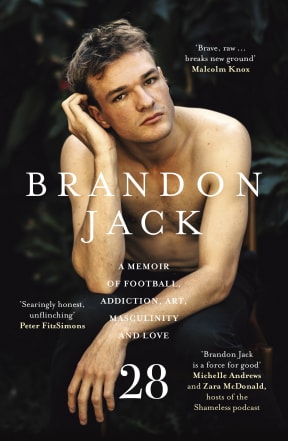Brandon Jack carried the weight of legacy as the son of a rugby league legend - Garry Jack - and his own extremely high expectations.
Brandon went on to play Australian Rules Football leaving the game at the age of 23, having played 28 professional games with the Sydney Swans.
His new book, 28: A Memoir of Football, Addiction, Art, Masculinity and Love, explores the sports culture that nearly broke him.
Jack never saw his dad play live but was driven to be like him by witnessing the fans' responses on the street.
When he won a trophy in his second game, he says he experienced first-hand that addictive feeling.
"I just remember that car trip home and mum talking to dad and they were both so excited, I'd done something to make them excited, I'd made them proud."

Photo: supplied
While he did enjoy playing as a child, he says there was a transition when he was recruited in 2013 as a member of the Sydney Swans Academy.
"Going [into professional footy] and having a moderate degree of success and having people patting you on the back and doing everything for you as well, there's definitely a risk that it can go to your head.
"I remember going back home after I'd had my first season with the Swans and people from school wanting to talk to me about footy and I was thinking I was super important because of how I was playing and definitely got absorbed into my own grandeur."
Despite the camaraderie and his passion, he says he knew the reality was it came down to business and getting the results.
"It's really hard to do what you love and have that be a business, and that's why I think so many players get to the position I was in, where this thing you played as a kid growing up that you loved is now your job and it causes you pain, and it's a really harsh dynamic.
"We always get fed the stories of the guys who wildly succeed and never have to worry about being in or out of the team.
"But what's the impact on someone who has that same drive and desire but doesn't get the results, and that's what I think is interesting about what I've written."
His launch into the athletic world also meant sacrificing his other hobbies out of fear of losing the sense of belonging to the sport or being rebuked, he says.
"I loved writing and I loved making music for example, but I never wanted to show those things while I was trying to be committed to the team because I didn't want anyone second guessing how much of a footballer I was or how committed I was to being the best footy player I could be."
At the time, he wrote in his diary as an outlet for the hardships and mentally draining thoughts he was experiencing, he says. Part of these now form his book too.
"I was pretty confronted by the psyche of this person I was reading, this hell-bent nature of wanting to be the best and continuously comparing myself to other players.
"If anyone does read the book and see the diary entries, then I think maybe they'll see something things that they've reflected on themselves or maybe it'll be confronting to see this is what some athletes are like."
Jack says the mental toll is unlike the physical aspects of the game, because you can't walk away from it.
"When we watch athletes perform, we only see for example in footy and NFL two hours each week of that team, that player ... but the thing is you don't just switch off after the game.
"All of our games were filmed from infinite different angles and I knew when something I'd done was going to come up in the team meeting on Monday, and I knew why it was going to come up.
"Then you kind sit there stewing on that for the weekend, then all of Monday you're worrying about this meeting at 3 o'clock in the afternoon and you're thinking what am I going to say when they bring me up, how do I deflect it or how do I accept it."
He knew he had to let go when he stood at his last game at the MCG stadium - the largest in Australia - and felt nothing, he says.
"There was this sense of emptiness that the two people I really wanted to play with and for [older brother Kieren Jack and assistant coach Rhyce Shaw] weren't there and I think that's what I was playing for the whole time as opposed to being a professional athlete."
On the other hand, the 27-year-old says he's grateful for the lessons he's been able to take from his journey in sports.
"The things I'm grateful for are some of the relationships I formed during my career and there's little values you learn, like dedication and commitment, and being able to handle not getting what you want.
"I've carried that with me now as a writer, those are traits I have when I write my pieces."

